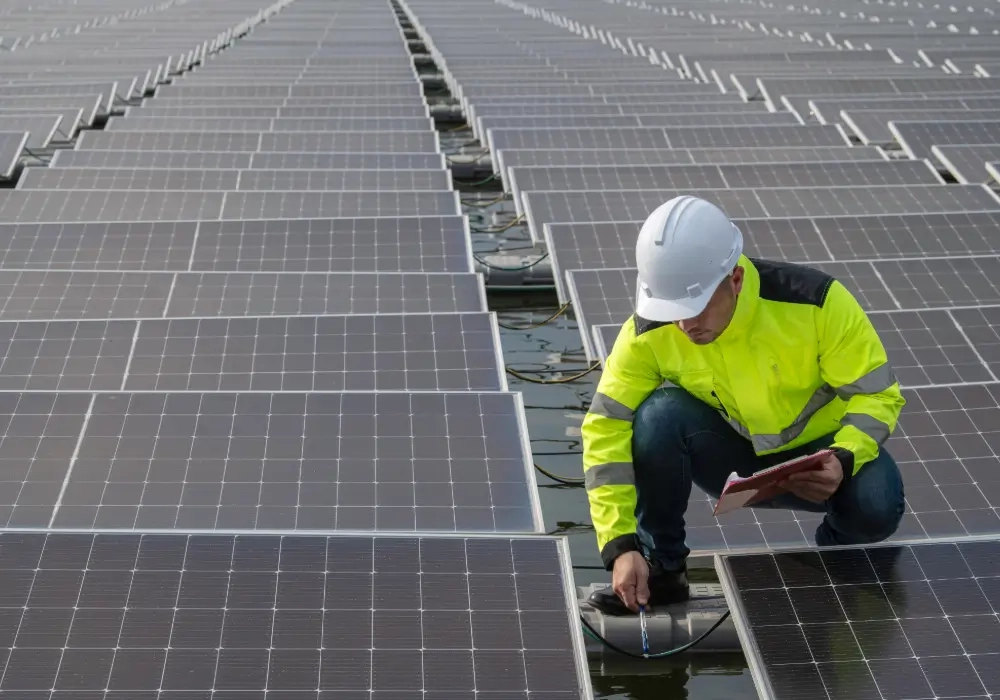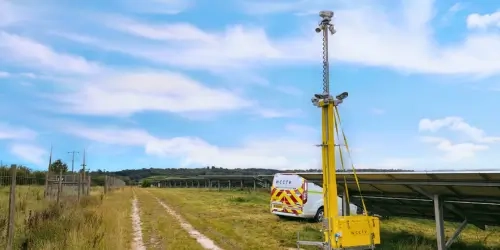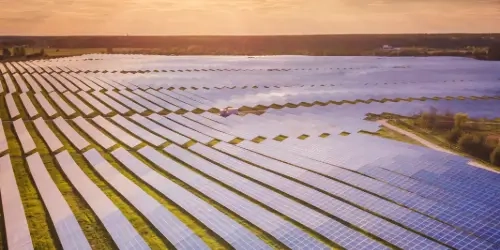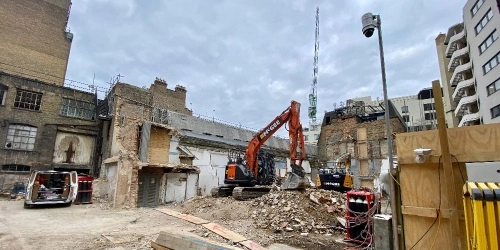Solar panel farms, particularly those under construction, face major security risks across the UK. Police data showed a 48% increase in solar panel and copper cable theft between 2021 and 2022 alone, with some solar sites falling victim to repeat attacks.
But solar farms' isolated locations and limited security measures result in costs that extend beyond replacing stolen equipment.
Theft and vandalism can lead to project delays and operational disruptions that significantly impact profitability, return on investments (ROI) and sustainability goals.
In this guide, we'll explore various solar farm security installations, what makes these renewable energy sites prime targets for criminal activity and how our robust security solutions can protect your valuable assets and prevent solar farm crime.
Why Do Solar Farms & Development Sites Need Security?
Established solar farms and development sites face unique security threats that standard site protection cannot address. The combination of valuable equipment, remote locations and extended construction phases creates ideal conditions for opportunistic thieves and organised criminal groups.
-
High-value assets: Solar sites contain renewable energy infrastructure worth millions. For context, a single 50 kW solar system costs around £30,000 to replace, while copper cabling is around £28,000 per 10 km stretch.
-
Isolated locations: Most solar farms and development sites are situated in remote locations with limited surveillance. The nature of these sites allows criminals sufficient time to operate undetected.
-
Solar farm theft: As mentioned, the high-value equipment found on solar sites makes them attractive targets for theft. Organised criminal groups often carry out coordinated, sophisticated heists, knowing that these components are easy to transport and have a high resale value on the black market.
-
Prolonged construction phases: Development sites often store uninstalled solar panels, copper cabling and other equipment, left unattended for long periods. This makes bulk theft a significant concern.
-
Vandalism, trespassing and protest action: Damage to critical infrastructure caused by vandals, protesters and squatters causes immediate energy production losses and costly emergency repairs that affect ROI.
-
Operational disruptions: Any security breach can disrupt operations and cause delays to site developments. For established solar farms, this can result in direct financial losses and potential Power Purchase Agreement (PPA) fines if clean energy targets are not met.
Visit our website to learn what poor security measures actually cost operators.
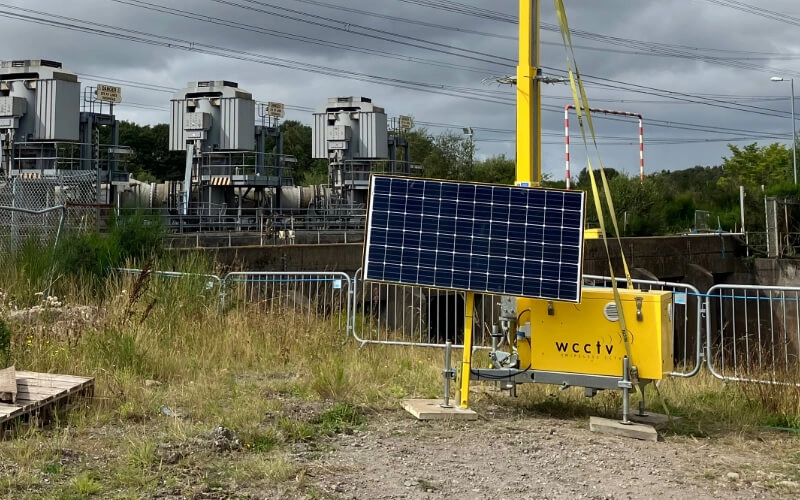
Solar Farm Security System Best Practices
Now that you know why solar farm security is of the utmost importance, let's discuss how you can implement robust security measures at your site.
The most efficient way to safeguard your solar site is through a multi-layered security strategy. This includes physical barriers like perimeter fencing, advanced CCTV cameras with thermal imaging and 24/7 professional remote monitoring, all working together to create a strong line of defence.
Physical barriers
-
Perimeter fencing: High-spec welded mesh fencing, compliant with British anti-intrusion standards, prevents unauthorised access to your site.
-
Access control: Security fencing with access control points such as keypads, PIN entry systems and remote-controlled electric gates helps restrict unwanted persons/vehicles from entering or exiting your site. Tamper-proof fittings and commercial-grade padlocks are also desirable.
-
Motion-sensors: Strategically placed motion-sensor lights, integrated with CCTV systems, automatically turn on when movement is detected. Advanced CCTV cameras with AI-video analytics can differentiate between genuine threats and false alarms like swaying vegetation.
-
PID systems: Perimeter intrusion detection systems (PIDs) provide immediate alerts when boundaries are compromised, deterring suspicious behaviour before it escalates to damage or theft. A few PID systems include ANPR (automatic number plate recognition), Time Lapse Video and portable systems, like our Hornet, that provide day-to-night surveillance.
-
Security personnel: On-site security guards serve as physical/visual deterrents on solar sites, monitoring access points and perimeters to prevent unauthorised entry.
CCTV surveillance
-
Advanced CCTV cameras: Strategically positioned high-resolution 4K PTZ (Pan-Tilt-Zoom) CCTV cameras provide near-360° coverage of your solar site. They monitor access points, equipment areas and perimeters to ensure thorough surveillance.
-
Thermal imagery surveillance: Thermal cameras provide reliable site protection in all weather conditions, including darkness. Our Thermal Solar Towers can detect intruders at distances of up to 200 metres and are specifically designed for off-grid, rural locations.
-
Night vision and infrared (IR): Advanced infrared technology ensures continuous surveillance even in complete darkness. IR illumination delivers clear footage regardless of lighting or weather conditions. Our Eco Towers, equipped with IR night vision, offer continuous protection and last up to 150 hours between fuel-cell charges.
-
CCTV Towers: Rapid Deployment CCTV Towers are visible deterrent units that can be installed within minutes (basic setups). Standing up to 6 metres tall, these self-contained, solar-powered systems provide full-spec security coverage during construction phases or ongoing operations.
-
Temporary CCTV: A fully-managed, short-term CCTV solution available for flexible rental periods. These systems are designed to detect and deter criminal activity for as long as your solar farm or development site requires protection and are often 88% cheaper than manned guards.
-
Solar-powered solutions: Off-grid solar sites typically lack access to mains electricity or reliable internet, making solar-powered security systems the most practical choice for uninterrupted site protection. Our Smart Towers operate independently of mains power and support eco-friendly deployment across a wide range of site types.
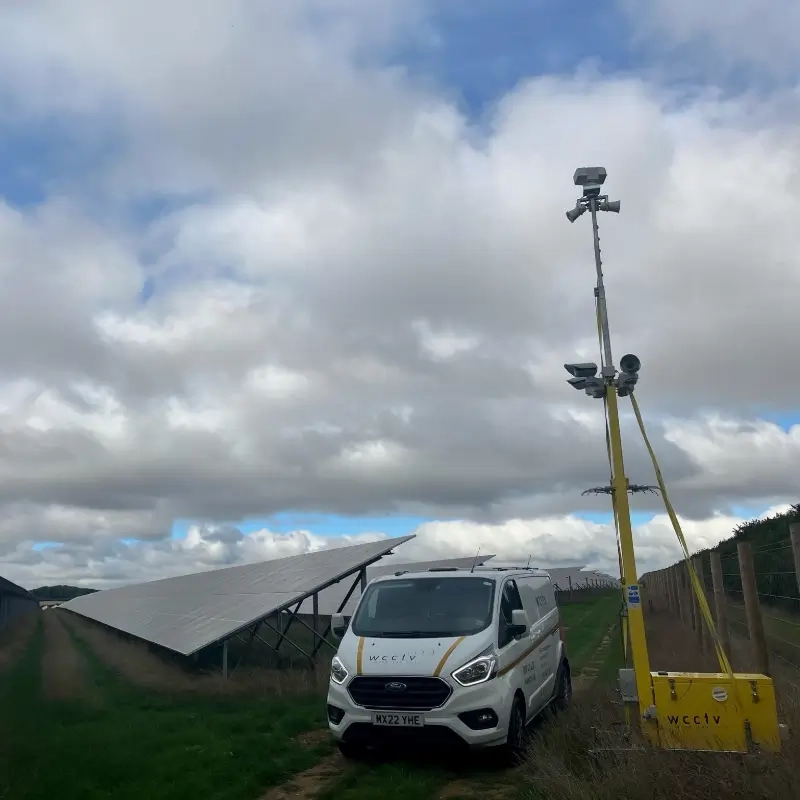
24/7 Remote monitoring services
-
24/7 remote CCTV monitoring: Active monitoring via NSI Gold Accredited monitoring centres, where trained security personnel review your camera footage in real-time. When a security threat is detected, they initiate immediate emergency action, such as live voice-down audio challenges, dispatching keyholding teams or contacting the police.
-
AI-video analytics: Intelligent detection software identifies suspicious behaviour and potential threats automatically. AI-powered CCTV systems reduce false alarms by analysing body heat, facial features and movement to differentiate between humans and animals.
-
Mobile keyholding and alarm response: Professional security response teams attend your site when security breaches are detected and provide detailed incident reports. Should emergency services be required, they signal an alarm without burdening you or your operations team.
Security Installation Challenges at Solar Sites
Installing security systems at solar farms and development sites comes with its own set of challenges. These sites are often remote, with site layouts constantly changing. This makes effective surveillance harder to implement and maintain.
Here are a few key issues:
-
Rural locations: Solar sites are often situated in isolated areas, away from populated urban spaces. Limited power sources, poor mobile/internet connectivity and slow emergency response times are just a few challenges solar farms and development sites face.
-
Lack of infrastructure: Development sites typically lack basic security infrastructure such as secure fencing, on-site lighting and permanent buildings where CCTV systems can be installed.
-
Weather conditions: UK weather conditions, like rain, fog, harsh winters and snow, can impact security systems' functionality. Being exposed to the elements can lead to shorter equipment lifespans, poor video footage and false alarms from swaying debris, foliage or wildlife.
-
Changing site layouts and blind spots: As solar farms upgrade panels and equipment, site layouts may evolve over time to accommodate expanding areas. A fixed CCTV camera setup can leave blind spots that criminals can exploit.
-
Budget constraints: Installing robust security systems at solar sites, including weatherproof cameras, motion detectors and secure fencing, requires significant upfront investments. For smaller operators, balancing security costs with long-term risk reduction can be challenging.
-
Insurance compliance: Proper solar security installations, with remote monitoring and night vision cameras, help meet insurer requirements and reduce risk. High-quality CCTV footage provides evidence of security breaches needed to back up claims.
-
Compliance with data laws: In the UK, CCTV systems must comply with the General Data Protection Regulation (GDPR) and the Data Protection Act 2018, which ensures responsible and ethical data handling.
-
ESG due diligence: Security installations at solar farms must comply with Section 61 guidelines and support ESG reporting. Advanced systems with environmental monitoring sensors provide real-time data on dust levels, air quality and weather, demonstrating operators' due diligence.
- Read more: What are Environmental Monitoring Systems?
With these installation challenges in mind, investing in the right security measures can make all the difference.
Invest in Smart Solar Farm Security Installations with WCCTV
Solar farm security systems aren't optional extras; they're essential infrastructure protecting multi-million pound investments.
Professional-grade security measures, like advanced CCTV systems, provide immediate protection, comply with regulatory standards and ensure long-term operations.
WCCTV is the UK's leading supplier of rapidly installed, mobile CCTV systems. With 6 regional hubs and 20-years of experience, our fully-managed solutions save up to 88% compared to onsite personnel.
Protect your development site or established solar farm against rising theft and security breaches, the smart way. Reach out to our team to discuss your installation needs today.
